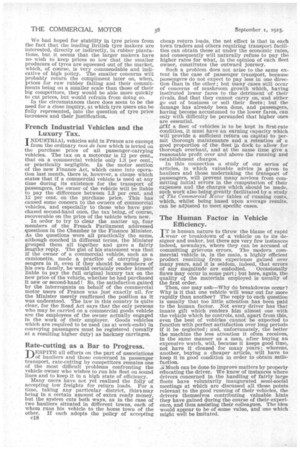French Industrial Vehicles and the Luxury Tax.
Page 2

If you've noticed an error in this article please click here to report it so we can fix it.
NDUSTRIAL vehicles sold in France are exempt from the ordinary tare de luxe which is levied on the purchase price of all passenger-carrying vehicles. The tax on a motorcar is 12 per cent., that on a commercial vehicle only 1.3. per cent., or practically negligible. In the motor section of the new Finance Act, which came into operation last month, there is, however, a clause which states that if a commercial vehicle is used at any time during its existence for the transport of passengers, the owner of the vehicle will be liable to pay the difference between 1.3 per cent. and 12 per cent, on the purchase price. This has caused some concern to the owners of commercial vehicles, and especially to those who have purchased second-hand ones, the tax being, of course, recoverable on the price of the vehicle when new.
In order to try to clear the matter up, four members of the French Parliament addressed questions in the Chamber to the Finance Minister. As the questions were all practically the same, although couched in different terms, the Minister grouped them all together and gave a fairly lengthy reply. The gist of his statement was that if the owner of a commercial vehicle, such as a camionette, made a practice of carrying passengers in it, even if they should be members of his own family, he would certainly render himself liable to pay the full original luxury tax on the new price of the vehicle, whether he had purchased it new or second-hand! So, the satisfaction gained by the interrogants on behalf of the commercial motor users of France was just exactly nil, for the Minister merely reaffirmed the position as it was understood. The law in this country is quite clear, for the Road Act says that the only persons who may be carried on a commercial goods vehicle are the employees of the owner actually engaged in the work of their employer. Goods vehicles which are required to be used (as at week-ends) in conveying passengers must be registered (usually at a resulting higher duty) as hackney carriages.




























